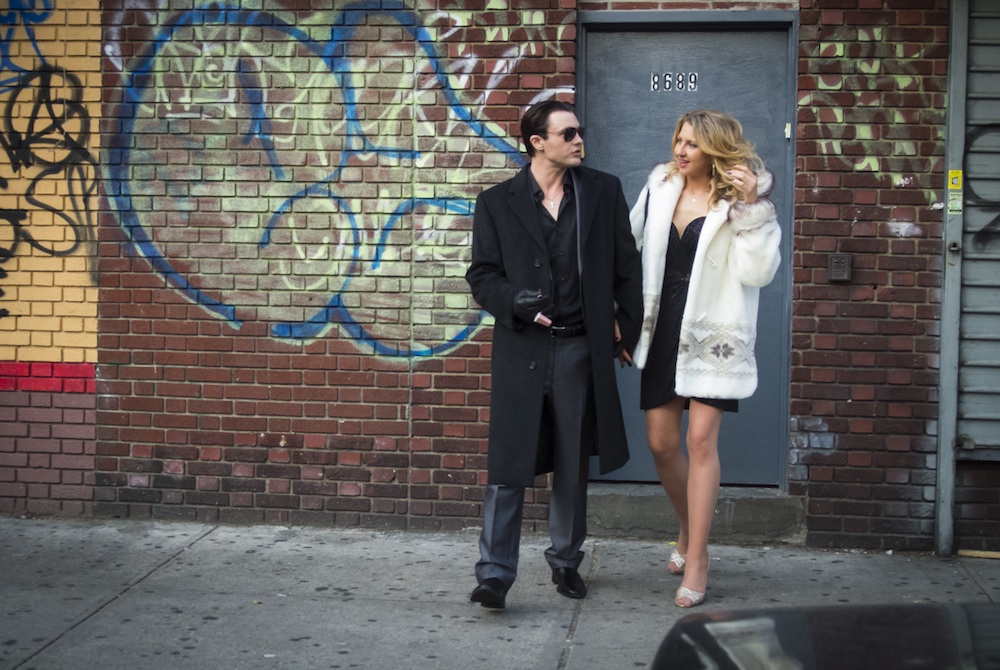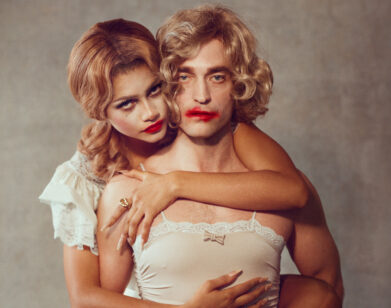Nina Arianda Has Character

ABOVE: MICHAEL PITT AND NINA ARIANDA IN ROB THE MOB. PHOTO COURTESY OF MILLENIUM ENTERTAINTMENT.
On Christmas Eve of 1992, Rosie and Tommy Uva were shot dead in their car. The New York mafia was losing power in New York: John Gotti, formerly the “Teflon don” and head of the Gambino family, had fallen, and Rosie and Tommy, a couple of kids from Queens armed with an Uzi machine gun and a getaway car, were successfully and serially robbing high-level mobsters.
Directed by Raymond De Felitta and written by Jonathan Fernandez, Rob the Mob recounts the story of the Uvas. “I think it’s the ultimate anti-hero story; you sympathize with everyone’s plight,” says Nina Arianda, who plays Rosie opposite Michael Pitt. “There’s such a willingness and a commitment from all parties to execute their prerogative that it’s hard to say who is the victim.”
Until now, Arianda has been something of a New York secret. The Ukranian-American actress’s most prominent roles have been on the stage rather than the screen; she received a Tony Award for her work in David Ives’ tense two-hander, Venus in Fur, and is currently starring in The Manhattan Theatre Club’s Tales from Red Vienna. 2014 will probably change that, however; in addition to Rob the Mob, Arianda is in The Humbling with Al Pacino and, according to the IMDb rumor mill, she’s up for the very coveted part of Janis Joplin in the upcoming biopic, Janis.
Arianda is invested in her craft. Ask her to name the favorite perfume of a former character and, although she might decline to share it, she would know. She knows her characters’ quirks and rituals, and it shows through in her performance. “It’s a constant love affair with each person, whether they’re great or not within their character—their personality, morals—doesn’t matter,” says Arianda. For Rosie Uva, Arianda’s point of entry was her long legs: “I asked our costume designer Tere [Duncan] what the focus was with Rosie,” she explains. “From there, we took it to different levels of my process: her scent, her sound, and everything else.”
EMMA BROWN: I never really thought of Michael Pitt as comedic actor, but he’s quite hilarious in the film.
NINA ARIANDA: Oh, he’s amazing. His physical comedy is extraordinary. I had never met him before the film. I met him over lunch, and then we worked together very briefly on camera. He’s wonderful; he’s so committed and so willing to play within the scenes. It makes you feel very free to also explore.
BROWN: Rosie has some great catchphrases in the film. Do you have a favorite one?
ARIANDA: We were given such freedom within the script by both Jonathon and Raymond—there was a lot of trust and a lot of improv. One of things that stuck with me within the freedom was the phrase “call it a day.” That was inspired by my hair stylist. That’s her catchphrase in life. And it came to us during the scene one day, so I used it. She was terribly shy about it, but I think she’ll be okay with it.
BROWN: Tommy and Rosie sit in on John Gotti’s trial in the film—did you sit in on any trials in preparation?
ARIANDA: No. It was my first time in a courtroom when we shot [Tommy and Rosie’s] sentencing. That was very eye-opening for me; just being within a New York City courtroom was terrifying—we had real bailiffs. It was just mind-blowing seeing people waiting for their fate—me playing or commenting on it seemed almost trivial that day. I had never been in a New York courtroom. I think I went on a field trip when I was nine in New Jersey, but I never actually set foot as an adult and it was terrifying. It’s very sterile, somehow. It seems so grand in the movies and it’s so sterile when you’re actually there.
BROWN: What is your earliest memory that you are willing to share?
ARIANDA: Having my grandfather, who was born in 1899, read the newspaper to me in a foreign language. I was utterly captivated by the fact that he took the time to read it to me. I didn’t know what he saying, it was in a completely different language. I think it was in French. But I was just so honored that he was with me and talking to me. It’s extraordinary that you know someone from that time, and also someone that’s willing to give you the time of day, who’s lived through so much.
BROWN: Do you come from a family of artists?
ARIANDA: Yes, my mother is a visual artist and my father is an artist of life.
BROWN: Did they encourage your acting ambitions? What did they say when you told them you wanted to be an actress?
ARIANDA: I think the way that I delivered my request was undeniable, and I think that I was blessed enough to have parents who saw it as something that there was no argument about. For that, I will always be grateful.
BROWN: When did an artwork last move you to tears?
ARIANDA: I was thinking about a piece a couple of days ago, and the thought of it moved me to tears. There’s a painting by Motherwell at MOMA, and I don’t know why it brings me to tears. I was thinking about it the other day after a show—I was just a little bit running on empty and it came to me. I can’t wait to go back and see it again. I love Motherwell.
BROWN: Did thinking about it invigorate you, even though it was a sad feeling?
ARIANDA: Of course. Because it’s still there, and it’s still present to allow me to ask myself questions about what I’m doing. I think that’s what visual art does—it either reminds you of something or allows you to question something. I don’t know why Motherwell; I love so many different artists. I’m currently working on Tales of Red Vienna and I’m very much into Klimt. I have a painting of his—well, a print; yeah right, “a painting”—in my apartment. [laughs] But for some reason, Motherwell came back to me the other day.
BROWN: Do you feel like a play is better at the end of the run than at the beginning?
ARIANDA: No, because I believe in the process so much—especially when it comes to New York. I think that’s what so exquisite and unique about New York, it’s a city that allows you to hone your craft as much as possible. There is no good or bad, somehow, strangely, there is no beginning or end. You certainly qualify it with the opening or closing of a run, but what’s extraordinary is that you are actually allowed to be an artist here. It’s very “belle époque,” but somehow continually. That’s why I love New York so much, honestly.
BROWN: Have you ever had an audition that just completely ruined your week?
ARIANDA: No—that would be ridiculous. If you love this job, then you have to know how to let it go. If you have a bad audition, I think you’re allowed 30 minutes of pain, maybe a day if it’s really that bad. But to allow a whole week? No. That would be contradictory to the process, I think.
BROWN: Did you discover this through working, or did someone tell you this?
ARIANDA: I think having pointers and having guidance from mentors is very important, but it never actually embodies what you go through. And if something doesn’t feel good, why do you repeat it? If you feel good bemoaning an audition for a week, go for it. But if you feel better bemoaning an audition that didn’t go very well for 30 minutes because you believe in the craft and the process, then I suggest you do that. And that’s what I suggest to myself. [laughs] The alternative is way too painful and destructive.
BROWN: What was the last thing you saw?
ARIANDA: I saw the Debra Messing, Brían O’Byrne play [Outside Mullingar] at MTC, by John Patrick Shanley. It was extraordinary, really. Shanley always has these amazing subtle messages, whether it’s in Doubt, or Moonstruck—it’s so incredibly personal to each individual in the audience. I was totally struck by his bolt that evening.
ROB THE MOB IS OUT NOW. TALES OF RED VIENNA IS CURRENTLY ON AT MANHATTAN THEATRE CLUB IN NEW YORK.






